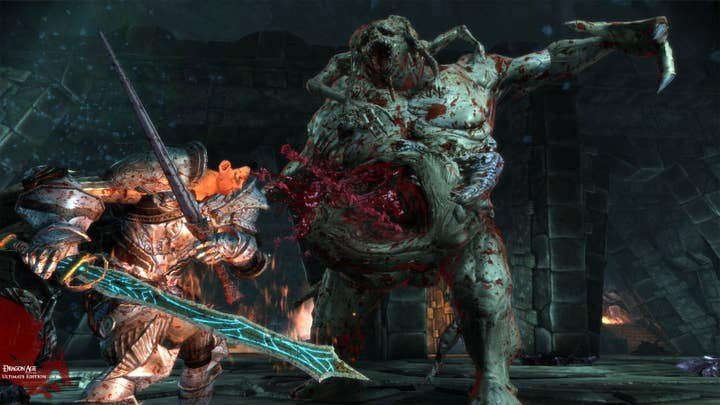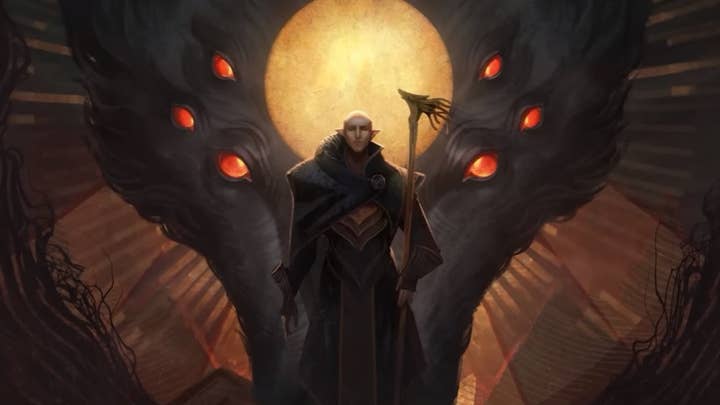Taking one for the team you've been kicked out of | Last Week in Business
As ex-BioWare devs file suit for severance, EA reportedly tells them Dragon Age: Dreadwolf hangs in the balance
Regular readers may be familiar with our This Week in Business column, a collection of stats and quotes from recent stories presented with a bit of opinion.
Last week's column had more than a bit of opinion, as it was pushing 5,000 words and still didn't cover everything we wanted.
To remedy the situation, we're running an addendum today discussing a subject we couldn't squeeze into last week's column: a lawsuit filed against Electronic Arts by seven former BioWare Edmonton employees who said the severance they were offered fell far short of what they should have received.
Alberta's Employment Standards Code only mandates eight weeks of pay for employees who work 10 years or longer for the same company, but there is no shortage of lawfirms drumming up business by citing common law standards that can get employees considerably more.
I'm guessing some of these people are going to have to leave the province to find a new gig, if not the country
Those common law standards generally take into account things like the overall health of the economy and how difficult it will be for the laid off people to find new work. With apologies to the Alberta game development scene, I'm guessing some of these ex-BioWare developers are going to have to leave the province to find a new gig, if not the country. Toss in the fact that the entire games industry seems to be on a firing spree right now, and these factors would suggest the laid off employees could get considerably more in severance than the Employment Standards Code strictly requires.
As for how much, their lawyers believe it should be about one month of severance per year of service. With the seven former employees averaging 14 years of tenure at BioWare, that's a significant amount of financial security hanging in the balance.
I fully admit that 14 months of severance sounds cushy. Luxurious, even.
But that's because in the world I live in, severance is generally measured in weeks rather than months or years. Still, I can dream of a better world. And I know EA CEO Andrew Wilson can, too.
After all, Wilson was chair of the compensation committee on Intel's board of directors when it gave Intel CEO Pat Gelsinger a contract specifying 18 months of severance (with 150% of his performance-related bonus and automatic vesting of the next 18 months' worth of time-based equity awards) if the company ever decides to get rid of him without cause.
(On a side note, maybe one of the reasons executive compensation is out of control because executives who benefit from skyrocketing executive pay are the ones on the boards of directors who decide how much executives should be paid. Just spitballing.)
Getting back to the ex-BioWare devs fighting for their bronzen parachutes, I agree it's not the best use of company funds to pay a bunch of people to not work for you, but that seems like the kind of thing you take into account before laying off a bunch of people who will be owed severance.
The fact that we're even here talking about this is weird, because EA certainly did not look like a company in need of layoffs when it announced in March that it would be cutting 6% of the company. And to Wilson's credit, he at least didn't even bother trying to plead financial necessity.
QUOTE | "Even amidst macro uncertainty, EA is operating from a position of strength. Our business is gaining momentum as we continue to deliver high quality games and amazing content across some of the largest, most beloved franchises in the world." – Wilson gives a pep talk in a March email to staff letting them know that roughly 775 of them are being laid off.
I guess it's time for the prerequisite look at how much money EA was making when it decided to fire hundreds of people who did nothing to deserve it.
STAT | $802 million – EA's net income for the year ended March 31, 2023.
Now hold on. Before we go jumping on EA for laying people off when the business was wildly profitable, let's remember that this is a publicly traded company so all that matters is feeding the beast with endlessly growing numbers forever and ever.
When that growth inevitably starts to slow down, you know you're in for a rough patch and you've got to ramp up the human suffering and throw a bunch of your people under the bus to show investors how serious you are about being the one business in all of recorded history that cracks the code and posts exponential growth infinitely forever. It's basic economics.
STAT | Up 2% - The year-over-year growth of EA's net income for that year.
See? 2%? That's practically flat. No investor is going to look at that and think EA is The Chosen One who will bring balance to the books, especially once all the charges associated with these layoffs hit those books.
Wait, what's that? EA actually recorded all its restructuring charges in the fourth quarter, so that 2% figure already includes the hit it was taking? Huh. OK then. So how much did all that restructuring and laying people off cost?
STAT | $155 million – EA's fourth quarter restructuring costs.
So what would that net income growth have looked like for the year without those costs?
STAT | Up 22% - What EA's net income growth would have been if it simply did not lay off hundreds of people.
EA could have easily enjoyed another year of robust profit growth, but it decided not to
Oh. So EA could have easily enjoyed another year of robust profit growth, but it decided not to. Instead, it "restructured" just enough to mute this year's gains without wiping them out entirely, lowering its expenses in the future and giving itself a much lower bar that will make next year's profit growth seem that much more impressive in comparison.
And EA knew investors probably wouldn't even punish the stock price for it because the underlying business was clearly healthy, layoffs are all the rage these days, and nothing says "good businessman" like fearful, depressed employees. (We call that The Kotick Doctrine.)
It's bad enough that EA would lay off hundreds of people when it didn't really need to. It's also not great that it would boot out some of its longest tenured employees, people who helped make BioWare what it was during its most celebrated era. And it's a bit worse that it would try to do so without paying them appropriate severance.
But what gets me most of all is a little detail about this story Kotaku reported based on a conversation with a lawyer for the employees, Alex Kennedy.
QUOTE | "Kennedy also said that some of the laid-off employees were given the impression that asking for the severance they're owed by law could potentially become a financial burden to the studio and further jeopardize the development of Dreadwolf, a game that's already had to be reworked and is reportedly overdue." – A line from Kotaku's story on the layoffs.
When layoffs happen, we're usually told it's a hard thing the company has to do, but it's not personal. It's just business. Money is money, and we have to make the bottom line work out. I'm sure that helps executives compartmentalize things, giving them a rational justification for mass layoffs while still letting them sleep soundly at night.
But if that's the way companies look at it, why can't employees look at it the same way?
Why are these laid off people – people who I will bet did not finish last year $802 million richer than they began it – being asked to ignore their own bottom line and their own financial security to benefit the company that just fired them?
One would assume the ex-BioWare developers don't want Dreadwolf cancelled. It would mean however much work they put into the project would never see the light of day. It would mean another black eye for the studio they gave an average of 14 years of their lives to. It would mean heartbreak on top of heartbreak for any colleagues still at the studio, who are already having to say goodbye to the co-workers, mentors, and friends that were laid off.

Companies pull this nonsense all the time. Whether it's developers accepting lower pay for the "prestige" of working for a big-name studio, demonstrating their passion through crunch, or persevering through miserable conditions because leaving would mean things getting worse for their co-workers left behind, there's a whole host of ways in which companies turn their employees' humanity against them.
There's a whole host of ways in which companies turn their employees' humanity against them
EA is just seeing if the same tricks will work on ex-employees.
To make matters worse, the implication that these severance packages being paid out appropriately would be the difference between Dreadwolf coming out or being canceled is absurd.
We've established that EA has already taken the financial hit for its restructuring plan, and it is rolling in money regardless. BioWare Edmonton is a studio of more than 300 people (as of 2019, at least). Giving seven former employees a little more than a year's worth of pay should not be a make-or-break factor for whether the team gets the game finished or not.
And even if these employees being paid their severance is the straw that breaks the camel's back and shuts down the project, that just makes the decision to undergo these layoffs look that much more like a reckless and arbitrary executive whim, a massively unnecessary and irresponsible gamble to save a buck that puts at risk years of AAA-scale investment into the game, to say nothing of what it could mean for BioWare as a whole after the studio has sustained a string of body blows through Mass Effect Andromeda, Anthem, and the sale of Star Wars: The Old Republic.
I don't think any business is going to leave the fate of something like that up to seven employees' worth of severance, particularly not a business churning out profit like EA has been, one with the wherewithal to simply cut a check and make the problem go away.
Just pay them the damn money EA. These people gave you some of the best years of their professional careers, and some of the best years of BioWare to boot. With all due respect to the Edmonton development scene, there's a good chance they'll have to move to find another gig.
At the very least, the full severance might see them through long enough for the industry to hit a point where executives at absurdly profitable companies have stopped firing people for no good reason and started hiring them again.
Sign up for the GI Daily here to get the biggest news straight to your inbox

